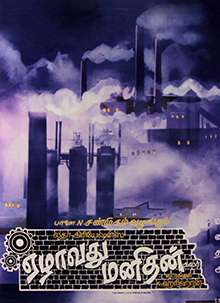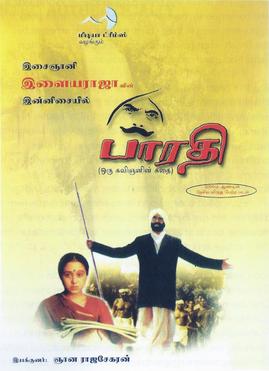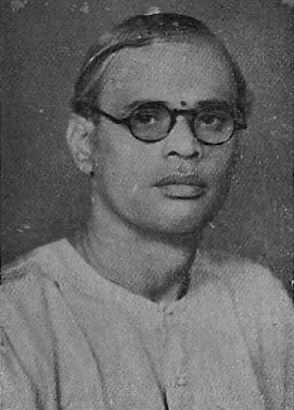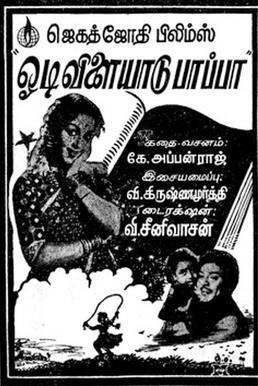
Tamil literature includes a collection of literary works that have come from a tradition spanning more than two thousand years. The oldest extant works show signs of maturity indicating an even longer period of evolution. Contributors to the Tamil literature are mainly from Tamil people from south India, including the land now comprising Tamil Nadu, Kerala, Eelam Tamils from Sri Lanka, as well as the Tamil diaspora.

C. Subramania Bharati(IPA: ; born C. Subramaniyan 11 December 1882 – 11 September 1921) was a Tamil writer, poet, journalist, Indian independence activist, social reformer and polyglot. He was bestowed the title Bharati for his poetry and was a pioneer of modern Tamil poetry. He is popularly known by his title Bharati or Bharathiyaar and also by the other title "Mahakavi Bharati". His works included patriotic songs composed during the Indian Independence movement. He fought for the emancipation of women, against child marriage, vehemently opposed the caste system, and stood for reforming society and religion.

Bharathidasan, was a 20th-century Tamil poet and rationalist writer whose literary works handled mostly socio-political issues. He was deeply influenced by the Tamil poet Subramania Bharathi and named himself "Bharathi dasan" meaning follower or adherent of Bharathi. His greatest influence was Periyar and his self-respect movement. Bharathidasan's writings served as a catalyst for the growth of the Self-Respect Movement in Tamil Nadu. In addition to poetry, his views found expression in other forms such as plays, film scripts, short stories and essays. The Government of Puducherry union territory has adopted the song of Invocation to Mother Tamil, written by Bharathidasan as the state song of Puducherry.

Vallinayagam Olaganathan Chidambaram Pillai was an Indian freedom fighter, lawyer, businessman and politician. He founded the Swadeshi Steam Navigation Company in 1906 to compete against the monopoly of the British India Steam Navigation Company (BISNC). He launched the first indigenous Indian shipping service between Tuticorin in British India and Colombo in Ceylon. Once a member of the Indian National Congress, he was later charged with sedition by the British government and sentenced to life imprisonment, and his barrister license was revoked. He is known by the epithet Kappalottiya Tamizhan. Tuticorin Port Trust, one of India's thirteen major ports, is named after him.

Ezhavathu Manithan is a 1982 Indian Tamil-language film co-written and directed by K. Hariharan. Inspired by a real-life incident, the film focuses on environmental pollution and exploitation of industrial workers. Starring Raghuvaran in his first lead role, it features a host of newcomers playing other prominent roles. The film's soundtrack was made up from an album composed by L. Vaidyanathan with the lyrics of Tamil poet Subramania Bharati.

Rabindranath Tagore was an Indian poet, writer, playwright, composer, philosopher, social reformer, and painter of the Bengal Renaissance. He reshaped Bengali literature and music as well as Indian art with Contextual Modernism in the late 19th and early 20th centuries. Author of the "profoundly sensitive, fresh and beautiful" poetry of Gitanjali, in 1913 Tagore became the first non-European and the first lyricist to win the Nobel Prize in Literature. Tagore's poetic songs were viewed as spiritual and mercurial; where his elegant prose and magical poetry were widely popular in the Indian subcontinent. He was a fellow of the Royal Asiatic Society. Referred to as "the Bard of Bengal", Tagore was known by the sobriquets Gurudeb, Kobiguru, and Biswokobi.

Fanfiction has encountered problems with intellectual property law due to usage of copyrighted characters without the original creator or copyright owner's consent.

Vidya Bharati is the educational wing of Rashtriya Swayamsevak Sangh (RSS). It runs one of the largest private network of schools in India, operating 12,000 schools with over 3.2 Million students, as of 2016 and has its registered headquarters in Lucknow with a functional headquarters in Delhi and a sub-office in Kurukshetra. In the year 2020, the million lives club selected Vidya Bharati as an official member of Vanguard cohort for its contribution to school education.

Gopikrishnan Kottoor is the pen name of Raghav G. Nair, an Indian English poet. He is best known for his poem "Father, Wake Us In Passing". He is also the founder editor of quarterly poetry journal Poetry Chain. Kottoor lives in Trivandrum, Kerala.

Fan fiction or fanfiction, also known as fan fic, fanfic, fic or FF, is fiction written in an amateur capacity by fans as a form of fan labor, unauthorized by, but based on, an existing work of fiction. The author uses copyrighted characters, settings, or other intellectual properties from the original creator(s) as a basis for their writing and can retain the original characters and settings, add their own, or both. Fan fiction ranges in length from a few sentences to novel-length and can be based on fictional and non-fictional media, including novels, movies, comics, television shows, musical groups, cartoons, anime and manga, and video games.

Bharathi is a 2000 Indian Tamil-language biographical film based on the life of Subramania Bharati starring Sayaji Shinde, Devayani and Nizhalgal Ravi. The film was directed by Gnana Rajasekaran and won the National Film Award for Best Feature Film in Tamil for the year 2000.

Vennikkulam Gopala Kurup (1902–1980) was an Indian poet, playwright, translator, lexicographer and story writer of Malayalam. He was the author of a number of poetry anthologies, besides other works, and he translated Abhijnana Shakuntalam, Tulsi Ramayana, Tirukkuṛaḷ, the poems of Subramania Bharati and two cantos of The Light of Asia of Edwin Arnold into Malayalam. He also contributed in the preparation of a dictionary, Kairali Kosham. A recipient of the Odakkuzhal Award and Thirukural Award, Kurup received the Kerala Sahitya Akademi Award for Poetry in 1966. Sahitya Akademi honoured him with their annual award in 1974.
A.R. Venkatachalapathy is an Indian historian, author and translator who writes and publishes in Tamil and English. Currently he is a professor at the Madras Institute of Development Studies (MIDS). He is noted for collecting and publishing the works of Tamil writer Pudhumaipithan.

S. D. Subramania Yogi was a Tamil director, playwright, screenplay writer and poet from Tamil Nadu, India.

Kappalottiya Thamizhan is a 1961 Indian Tamil-language historical drama film produced and directed by B. R. Panthulu. The film stars Sivaji Ganesan, Gemini Ganesan and Savitri. It is based on the 1944 book of the same name by M. P. Sivagnanam, a biography of V. O. Chidambaram Pillai who founded the Swadeshi Stream Navigation Company to break the monopoly of the British over maritime trade out of India.

Thai Ullam is a 1952 Indian Tamil-language film directed by K. Ramnoth. Starring V. Nagayya, Manohar and R. Ganesh, the film has music composed by Nagayya and A. Rama Rao. It is an adaptation of the 1861 novel East Lynne, by Ellen Wood. The film was released on 9 February 1952, and emerged both a critical and commercial success.

Thiruvananthapuram Kannuswamy Shanmugam was a Tamil theatre and film artist. He acquired the prefix "Avvai" after portraying saint-poet Avvaiyar in a play.

Thirumanam (transl. Marriage) is a 1958 Indian Tamil-language romance film directed by A. Bhimsingh, and produced and written by Valampuri Somanathan. The film stars Gemini Ganesan and Savitri. It revolves around a singer who does not sing for money, believing there is a curse upon him that if he did so, he would die.

Odi Vilaiyaadu Paapa is a 1959 Indian Tamil-language film directed by V. Srinivasan. The film stars S. S. Rajendran and B. Saroja Devi.
M. L. Thangappa was a Tamil writer and translator. He wrote many poems, articles and translations.

















